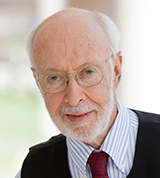Stanley G. Nathenson, M.D.
Renowned Einstein Immunologist Remembered
October 17, 2012 – (Bronx, NY) – Albert Einstein College of Medicine of Yeshiva University is deeply saddened by the death this past weekend of renowned immunologist Stanley G. Nathenson, M.D., the Samuel H. Golding Chair in Microbiology and distinguished professor of microbiology & immunology and of cell biology. His work provided seminal insights that contributed to making transplantation a routine medical practice to treat patients with failing organs. He was 79.

Stanley Nathenson, M.D."Since 1965, when he first joined the Einstein faculty, Stan quietly and persistently pursued the mechanisms of T-cell activation and helped define the immunological basis for organ transplant rejection," said Einstein Executive Dean Edward R.Burns, M.D.
For decades, Dr. Nathenson played a leading role in discovering the molecular and cellular mechanisms that are responsible for the activation of T cells and initiation of the immune response to pathogenic viruses, transplants and tumors. Throughout his career, he focused on critical questions and developed new methodologies that have greatly advanced the understanding of cellular immunology and graft rejection.
Before joining the Einstein faculty, Dr. Nathenson received his B.A. from Reed College and M.D. from Washington University School of Medicine. He pursued further training at the National Institutes of Health and the Queen Victoria Hospital, East Grinstead, Sussex, England. In 1973, he became a professor in the departments of microbiology & immunology and of cell biology at Einstein. He held many leadership positions at the College of Medicine, including director of the immunology and oncology training program, through which he trained more than 80 young scientists, many of whom advanced to respected positions in academia and industry.
"Since 1965, when he first joined the Einstein faculty, Stan quietly and persistently pursued the mechanisms of T-cell activation and helped define the immunological basis for organ transplant rejection."
-- Edward R. Burns, M.D.
"Stan was renowned as a mentor of young scientists and trained dozens of investigators," said Arturo Casadevall, M.D., Ph.D., professor and chair of microbiology & immunology and the Leo and Julia Forchheimer Chair in Microbiology & Immunology. "He leaves a legacy of offspring laboratories that will continue to make contributions to immunology for many years to come."
Dr. Nathenson served on various government committees and editorial boards and received numerous awards for his innovative research, including election to the National Academy of Sciences in 1988. The research he conducted over nearly 50 years, resulting in close to 250 publications, represents a stunning contribution to the field of immunology. Dr. Nathenson continued to display his trademark creativity up until the week before his death.
"Stan understood what we needed to learn to change the paradigm of T-cell activation," said Matthew Scharff, M.D., distinguished professor of cell biology and of medicine and the Harry Eagle Chair in Cancer Research/National Women’s Division. "His imagination and ingenuity inspired his colleagues and generations of scientists who followed him."
The research achievements of Dr. Nathenson exemplify Einstein’s tradition of turning science into knowledge that expands the understanding of the human body and improves the lives of patients. The Einstein community extends its deepest condolences to his wife, Susan, of Pelham; his two sons, John and Matthew; his four grandchildren; and his two siblings, Howard and Lee Rose.
Other Top Stories
9/11 World Trade Center Exposure Linked to Heart Disease Among NYC Firefighters
On Becoming a Physician: New Einstein Students Receive White Coats and Stethoscopes
Novel Therapy for Acute Migraine Shows Promise in Phase 3 Clinical Trial
First Complete Wiring Diagram of an Animal's Nervous System
Multimillion Dollar NIH Grant to Help Reduce Opioid Use & Get Care to People Who Need It
NIH Grant Funds $23 Million Study of Diseases Affecting People Living with HIV
New TAILORx Data Guides Adjuvant Therapy in Younger Breast Cancer Patients
Einstein Celebrates Its 61st Commencement
Bolstering Biopsies: Testing Patients' Individual Cells to Guide Treatment



Tablet Blog